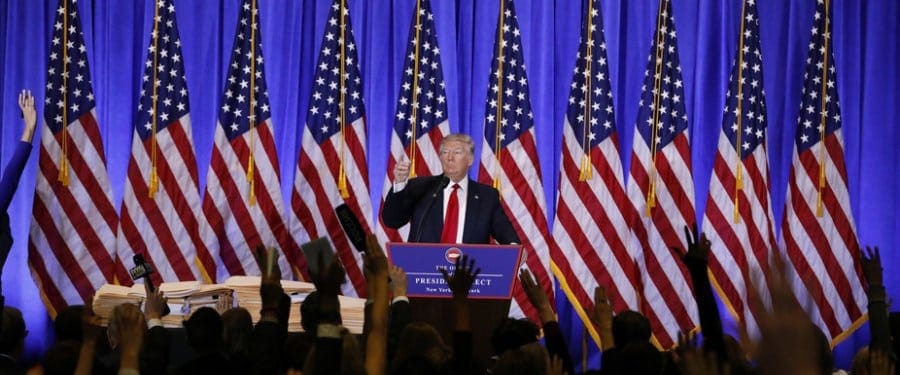If it weren’t quite so serious, it might be amusing. President-elect Donald Trump – the words are still rather difficult to believe – prefers to protect the reputation of one of the US’ perennial foreign policy rivals, rather than that of his own intelligence agencies.
Given what is already known and incontrovertible about the international behaviour of Vladimir Putin’s Russia, this is surprising, to put it mildly. Russia, after a brief moment of apparent political liberalisation in the aftermath of the Soviet Union’s demise, has turned into a truculent, authoritarian byword for corruption and geopolitical opportunism.
What explains Trump’s warmth for Putin, and the latter’s apparent efforts to secure Trump’s election victory by hacking into and releasing the embarrassing emails of his Democratic opponents? Given Putin’s apparent loathing for Hillary Clinton, his motives are not difficult to discern, but Trump’s take some explaining.
Even the least-alarming possible explanations are bad, hard to believe, and ought to disqualify Trump from the presidency. At best, Trump has extensive financial links to Russia, as he looked for funding there when American banks stopped lending to him following his multiple business failures. Such links might help explain his reluctance to upset his Russian creditors.
Other members of the Trump team also have extensive business links to Russia, and not just the prospective Secretary of State, Rex Tillerson, whose close, mutually enriching ties to Putin are well-documented. On the contrary, both a key member of Trump’s campaign team (Paul Manafort) and one of his foreign policy advisors (Carter Page) have significant economic interests in Russia.
Even more remarkably, Michael Flynn, one of Trump’s principal security advisors, is also keen to improve ties with Russia – something he demonstrated by speaking on behalf of RT, Russia’s principal propaganda outlet.
True, James “Mad Dog” Mattis takes a more traditional, hardline view of Russia, but he could well find himself uncharacteristically outgunned when it comes to standing up to Putin in the Trump cabinet.
Mattis may have an unlikely ally in Tillerson, who was at pains to give the impression of even-handedness toward Russia during his confirmation hearing. His remarks about Russia were overshadowed by the prospect of outright conflict with China, however, when he suggested that China’s access to the contested islands it has claimed and fortified in the South China Sea “will not be allowed”.
What was most remarkable about Tillerson’s comments on Russia was his – frankly unbelievable – claim that he had not discussed policy toward Russia with his new boss. At best this is simply an outright lie; at worst, it indicates how dysfunctional, unco-ordinated and unfocused the Trump administration actually is.
Even more unbelievably – but sadly no less improbably – it is possible that Russia may be in possession of compromising videos of the putative leader and standard-bearer of the free world. Sadly, it is only too believable that a man who boasts of his ability to molest women because of his position and power would behave in the way that has been alleged by apparently credible intelligence sources.
Even those who regard Trump’s personal morals and behaviour as irrelevant must concede that it is quite extraordinarily compromising, dangerous – not to say unprecedented – that an American president might be subject to blackmail by a foreign power. Incredible as all this may sound, it could actually be true.
Trump’s first press conference since winning the presidency was a predictably unsettling affair, even without the sexual allegations. The president-elect’s response was equally predictable: a rather nauseous combination of bluster, bragging and bullying of a sort with which we have already become depressingly familiar, even before he actually takes office.
Perhaps the most dispiriting aspect of all this for anyone who values freedom of speech and an independent media was Trump’s instinct to shoot the proverbial messenger. True, so far that’s just a metaphor, but let’s hope the historical allusion to Nazi Germany in Trump’s stream of consciousness was just poorly chosen, not a source of inspiration.
Speaking of Der Fuhrer, it’s also worth keeping in mind the sort of people Adolf recruited as allies: like-minded megalomaniacs with no time for institutional or legal constraints of a sort that might inhibit especially brilliant people from acting decisively.
Putin and Trump have clearly got that much in common, at least. It only remains to be seen whether America’s celebrated checks and balances will prove any hindrance to Trump giving full expression to his monumental egomania and self-obsession.
Whatever Trump does it will be leadership of a sort, even if it’s characterised by a flagrant disregard for probity and morality, and the ultimate destination is a new dark age of political repression, rancour and vilification. Who, after all, is going to stop him? Not Putin or the swelling ranks of authoritarians around the world, that’s for sure.
Whatever else you may have thought about Barack Obama, he was a thoughtful, generally decent human being who could string a sentence together – without talking about himself in the third person. He already looks like a giant compared with his successor. Indeed, we are unlikely to even have a honeymoon period with Trump. But, then again, that’s not such a bad thing when you think about it.
By Mark Beeson, Professor of International Politics, University of Western Australia
This article was originally published on The Conversation. Read the original article.
TOP IMAGE: Donald Trump at a press conference earlier this week (Reuters/Lucas Jackson)












